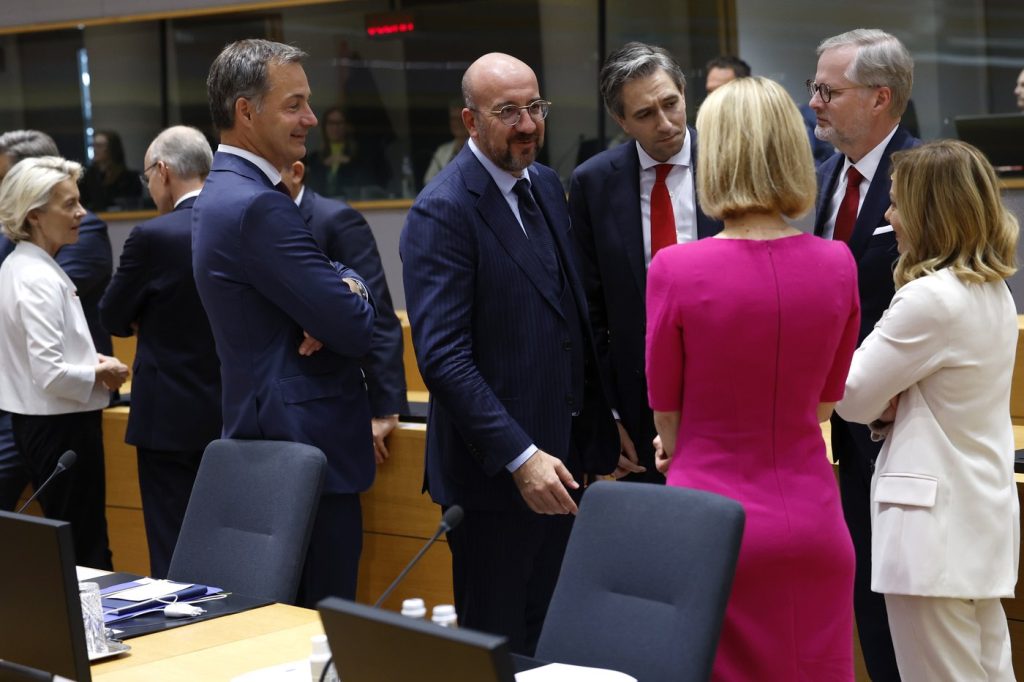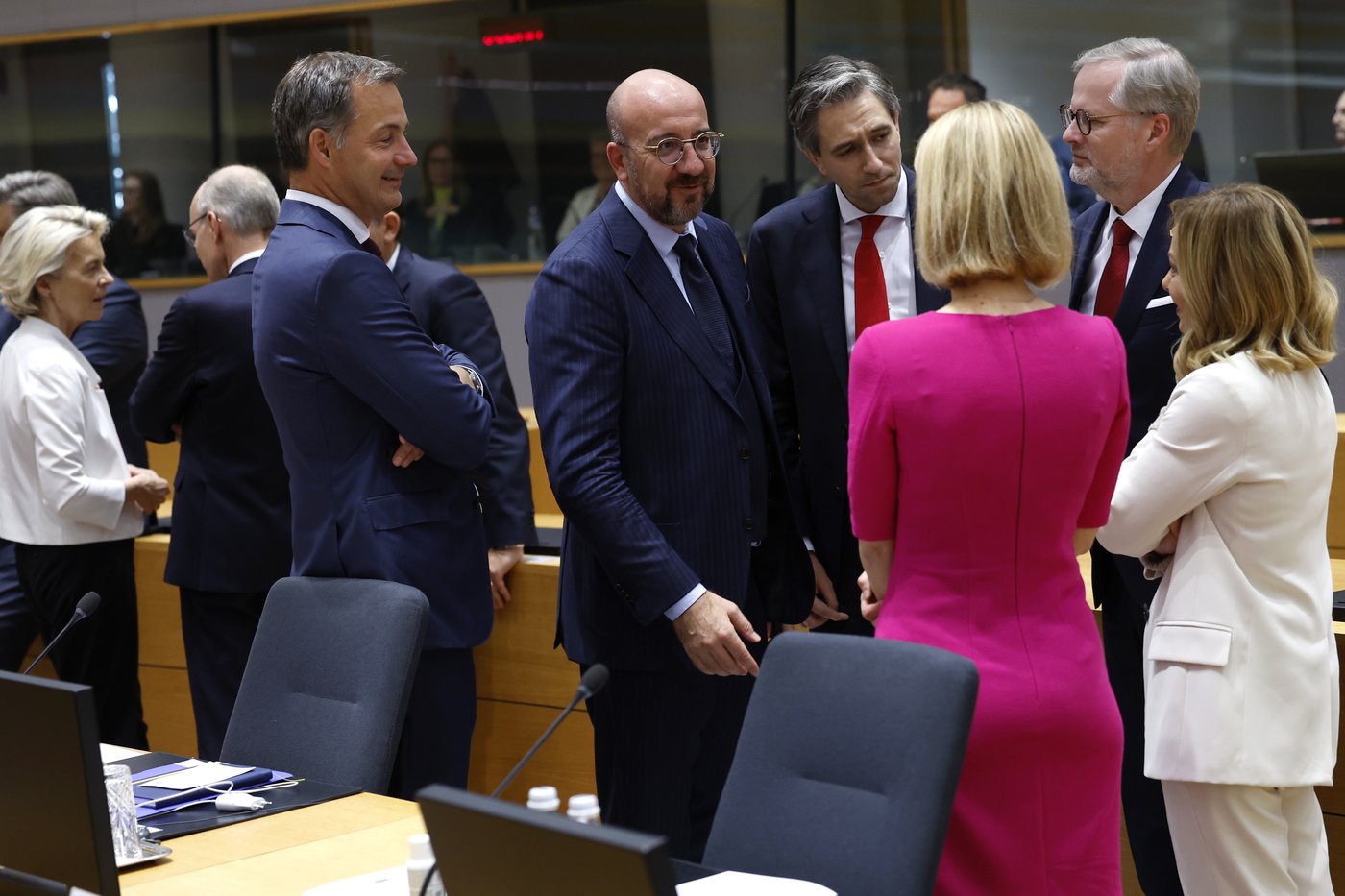
BRUSSELS (AP) — Leaders of European Union countries reached no final agreement on candidates for the bloc’s top jobs Monday, but several praised the record of European Commission President Ursula von der Leyen, and she appeared on track to secure their endorsement later this month for a second term in office.
“There is no agreement tonight at this stage,” EU Council President Charles Michel said after chairing an informal dinner summit in Brussels.
The 27 leaders were weighing the fallout from the recent European elections and how to take those results into account as they nominate candidates for the top posts.
“This conversation was today a useful step to prepare the next European Council,” Michel said, referring to the next meeting of EU presidents and prime ministers June 27-28. He refused to be drawn out on the chances of von der Leyen and others, saying only: “It will be clarified next week.”
The June 6-9 elections saw the European Parliament shift to the right and dealt major blows to mainstream governing parties in Paris and Berlin. The Franco-German motor that usually propels EU politics along was notably weakened, and hard right parties there gained ground.
Still, names for the big posts have circulated in Brussels for months.
Former Portuguese Socialist Prime Minister António Costa is frequently mentioned for Michel’s job — the role of council president. Estonian Prime Minister Kaja Kallas, well known for her tough line on Russia, has been floated as the bloc’s potential top diplomat.
Under the EU’s treaties, the leaders’ choice of candidates should reflect the results of the election, sharing the posts among the winners.
In a post on X, Hungarian Prime Minister Viktor Orbán, who leads a staunchly nationalist government, said that “the will of the European people was ignored” by the other leaders.
He complained that mainstream parties had “made a deal and divided the top jobs of the EU among themselves. They don’t care about reality, they don’t care about the results of the European elections, and they don’t care about the will of the European people.”
Under the EU’s complicated division of powers, the leaders get to nominate the next president of the commission, which is responsible for drawing up EU policy on everything from climate to the colossal shared budget.
“I’m positive about Ursula von der Leyen,” Dutch Prime Minister Mark Rutte told reporters as he arrived for the meeting.
Over the last five years, Von der Leyen led a huge drive to secure billions of COVID-19 vaccine doses during the pandemic, set up an economic recovery fund and drummed up support for Ukraine in its war with Russia, including by backing Kyiv’s future EU membership.
But Rutte added: “I’m not saying that we support her. There is a big possibility that we will, but it will be of course a question of how the whole package will emerge.”
That package involves three other top jobs: Council president; EU foreign policy chief, currently Josep Borrell of Spain, from the center-left; and president of the European Parliament, currently the conservative Roberta Metsola from Malta.
The council president’s job is to broker deals between the 27 member states, while the top diplomat represents the EU on the world stage.
German Chancellor Olaf Scholz dodged questions about whether he personally endorsed von der Leyen for a second term, but underlined that his backing would depend on her working with mainstream parties rather than right-wing parties.
Ahead of the election, many socialist and Green lawmakers criticized von der Leyen for trying to win the support of Italian Prime Minister Georgia Meloni, who is from the right-wing populist Brothers of Italy party.
“What is clear is that there cannot be a commission presidency based on the support of right-wing and right-wing populist parties,” Scholz said.
Several leaders had said they did not expect a final agreement on the nominees Monday night, but they did insist the process should not drag on.
“I don’t think there’ll be any gratitude from Irish citizens or European citizens if politicians here in Brussels are talking for weeks on end about who’s going to do what role when there are so many pressing issues on a European and global level,” Irish Prime Minister Simon Harris said.
Von der Leyen, a German conservative who did not speak to reporters as she arrived at the summit, is well placed after a strong showing for her center-right European People’s Party (EPP) parliamentary group.
But nothing is guaranteed. Von der Leyen’s presidential style has at times riled her commission colleagues, and she is deeply unpopular in some corners of the EU Parliament, where she will need the support of 361 of the 720 lawmakers to keep her job.
Polish Prime Minister Donald Tusk said mainstream parties — like the EPP he hails from, the center-left Socialists and Democrats, and the pro-business liberals — still hold a majority in the assembly, despite hard right successes in France and Germany.
“My feeling is that it’s enough to arrange the whole new (job) landscape, including the president of the commission,” he told reporters ahead of the meeting.
But Tusk did call for some “public clarification, what is the legal situation” surrounding Costa and the corruption scandal in Portugal that forced him out of office. Costa stepped down after eight years as head of government. He has not been accused of any crime.
___
Associated Press writers Angela Charlton in Paris and Geir Moulson in Berlin contributed to this report.
Ella Joyner, Lorne Cook And Samuel Petrquin, The Associated Press

